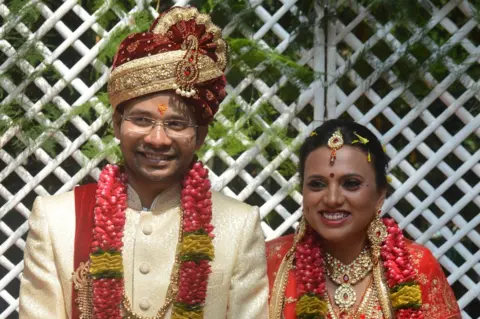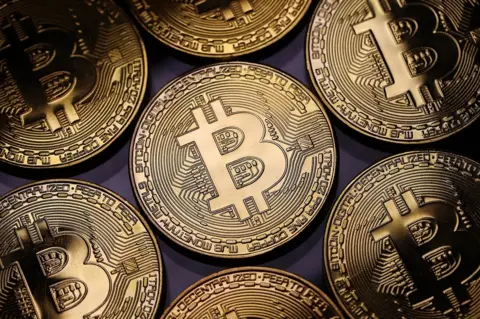The Indian wedding that bet on Bitcoin
 Kashif Masood
Kashif MasoodWhen Prashant Sharma and Niti Shree were planning to marry, they decided to ask for something unusual as a wedding present - the cryptocurrency, Bitcoin.
The couple, who live in the south Indian city of Bangalore, are founders of a digital start-up and many of their friends also work for technology companies.
"So we thought of merging technology with gifting for the future," said Mr Sharma. "We explained it to our parents and they were very receptive."
The wedding took place on 9 December, just four days after India's central bank issued its third warning cautioning investors against buying Bitcoins.
But that didn't seem to discourage their friends and family.

What is Bitcoin?
There are two key traits of Bitcoin: it is digital and it is seen as an alternative currency.
Unlike the notes or coins in your pocket, it largely exists online.
Secondly, Bitcoin is not printed by governments or traditional banks.
A small but growing number of businesses, including Expedia and Microsoft, accept Bitcoins - which work like virtual tokens.
However, the vast majority of users now buy and sell them as a financial investment.

Only 15 of the nearly 200 wedding guests gave the happy couple "traditional gifts". Mr Sharma estimates they received Bitcoin worth 100,000 rupees ($1,559; £1,169).
"The concept is good," said one relative who gifted them Bitcoin but did not wish to reveal his name. "I am sure its acceptance will improve though many governments may not like it now."
"Prashant and Niti did not decide on Bitcoin as a gift in the last couple of weeks," said Ravi Shankar, another guest. "It was planned a couple of months ago."
The recent surge in the price of Bitcoin has led many to wonder if it is a bubble.
Mr Sharma said this did not worry him much.
 Getty Images
Getty Images"If you buy something to sell it later then you are creating a bubble. We bought Bitcoin because we wanted to see how this technology moves forward," he said.
"Bitcoin is not the only thing that has potential. Blockchain technology is the real deal," he added.
Blockchain, the technology underpinning Bitcoin, is a method of recording data - a digital ledger of transactions, agreements and contracts. Many banks have said it could transform the future of financial transactions.
"The disruptive potential of blockchain technology is so huge that it just cannot be banned," Mr Sharma said.
Experts say they can understand why regulators are concerned.
"Regulators find that there is not enough transparency in the ownership and management of cryptocurrency," said Pranjal Sharma, an economic analyst.
"It is not that they are bull-headed or orthodox. Governments just want to be careful."
Mr Sharma said he and his wife will sell the Bitcoins they have received to fund initiatives that educate underprivileged children.
